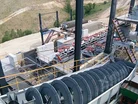Platinum Slump Sees ARM Target China Chrome Market

Strong demand from China’ for chrome ore is prompting one of South Africa’s leading miners to turn away from platinum and towards chrome, it has been reported.
African Rainbow Minerals (ARM) is pursuing chrome and copper opportunities after weak platinum prices drove its annual profit down by almost half (43%).
ARM's headline earnings slumped to 5.08 billion rand ($286.89 million) in the year ended June 30, down from 8.98 billion rand the previous year.
The company's board has now approved the construction of a chrome recovery plant at its Bokoni platinum mine.
Chromium is used to harden steel, to manufacture rust-resistant stainless steel and to produce several alloys. Chromium plating, meanwhile, is used to give a mirror finish to steel. It is also used in heat- and corrosion-resistant materials, leather tanning, chemicals production and heat-resistant refractory materials for metallurgical furnaces.
China’s demand for chrome ore and high-carbon ferrochrome is driven by its high levels of stainless steel output. In 2023, global chrome ore production saw an increase, fuelled by heightened demand from Chinese smelters.
In May, ARM acquired a 15% stake in Surge Copper, which has two copper exploration projects in Canada.
Other miners in South Africa, including Sibanye Stillwater and Harmony Gold have also recently diversified into critical metals such as lithium and copper, which are vital for renewable energy systems.
ARM’s move away from platinum is indicative of the wider malaise in South African platinum output. The country is the world's top supplier of the metal, but its platinum industry has been gradually declining since a peak of about 5.3 million ounces in 2006.
Platinum in South Africa in decline
Northam Platinum CEO Paul Dunne recently told Reuters that South Africa's platinum mining industry has entered a phase of “irreversible decline”, as producers struggle with low prices, and demand suffers from the rise of battery electric vehicles.
The price of the precious metal once topped $2,000 an ounce, but has fallen 13% since the beginning of 2023, to $939 an ounce.
Along with its close relative palladium, the two metals are used chiefly in the catalytic converters used to clean exhaust fumes by the auto sector. It's a market that accounts for around 40% and 80% of demand for platinum and palladium respectively.
Platinum output in South Africa, the world's top supplier of the metal, has been gradually declining since a peak of about 5.3 million ounces in 2006, according to data from Johnson Matthey.
Dunne said he expects South African output to fall by about 10% over the next five years to around 3.5 million ounces from some 3.9 million ounces currently.
South African platinum production has suffered for many years from under-investment in new mines, while growth in battery-powered vehicles has also affected demand. However, a surge in sales of hybrid cars -- as electric vehicle take-up slows -- is set to provide an unexpected boost to demand for platinum group metals in the coming years.
South Africa's platinum miners, among the country's largest foreign currency earners, employ more than 181,000 workers directly. The sector's decline mirrors that of South Africa's gold mining industry, which was once the world's largest, but now ranks 12th globally, according to the World Gold Council.

